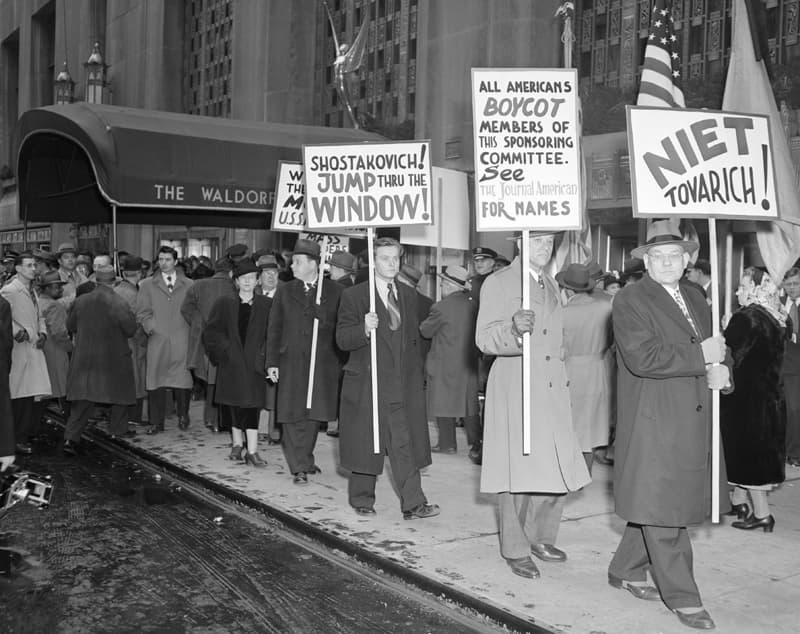
Protesters at the Peace Conference
A group of foreign delegates arrived in New York in late March 1949 to advance the cause of world peace. The “Cultural and Scientific Conference for World Peace” was to prove that the Iron Curtain did not divide the world, but “instead, the world was divided by those trying to foment war and the millions who were seeking peace.”
Aaron Copland
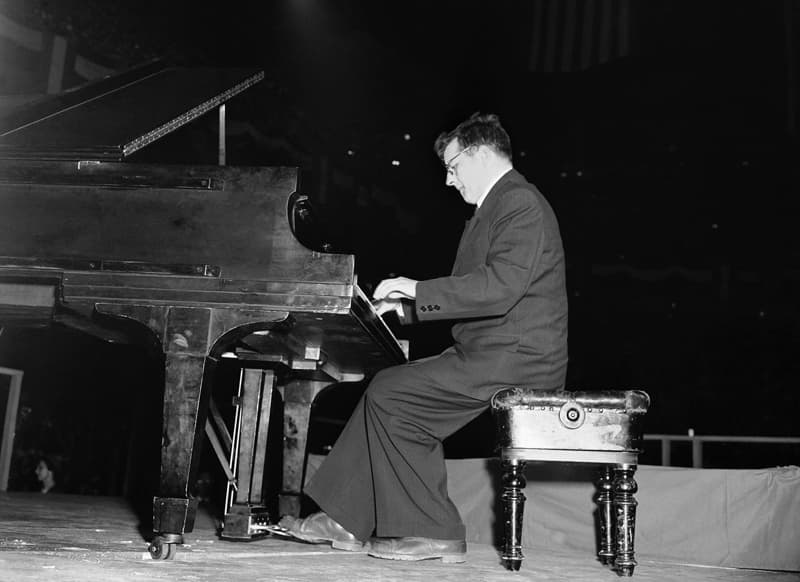
Shostakovich playing at Madison Square Gardens
Among the delegates were seven Russians, including no other than the celebrated Russian composer Dmitri Shostakovich. Two talented Americans affiliated with the upcoming Conference, the young novelist Norman Mailer and the composer Aaron Copland met the Russian delegation. Of course, there was considerable opposition to the arrival of the delegates, as representatives from the Catholic War Veterans, the Jewish War Veterans, and the People’s Committee for the Freedom of Religion formulated a clear strategy, “to strike back with prayer and protest—a prayer that liberation will come soon for the Russian-enslaved millions.” America was clearly growing obsessed with communism, and the FBI started a file on Copland saying, “The subject, thought to be self-employed as a composer of music.” Linked to communist front groups, within six months Copland was classified as a communist.
Aaron Copland: Piano Sonata in G Major (Ramon Salvatore, piano)
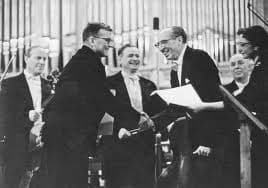
Aaron Copland and Dmitri Shostakovich
The government spent the next two decades monitoring Copland, analyzed his comments, and took note of his friends and associates. They wanted to prosecute Copland for perjury and fraud for denying that he was a communist, and the CIA tracked the composer’s travels. Copland’s music was pulled from President Eisenhower’s inaugural concert in 1953 due to suspicions about his politics. He denied ever being a communist when called to testify to Congress. The investigation of Copland ended in 1975, but opinions are still decisively divided on whether the “dean of American music” was a communist sympathizer.
Louis Durey
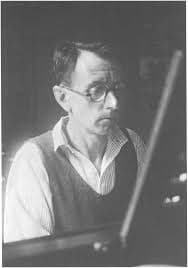
Louis Durey
There is no such debate when it comes to Louis Durey (1888-1979), a member of the famed “Les Six” in Paris during the early 1920s. Durey was perhaps the enigma of Les Six, and because of shyness and fear of displaying his works alongside his colleagues, he retired to the south of France and devoted his life to communism. He became a faithful member of, and composer to, the French Communist Party and composed a number of rally songs for trade unionists and members of the political left. He even wrote a cantata in 1949 called La Longue Marche to a text by Mao Zedong. Protesting French and subsequent US involvement in Vietnam, he also set 2 poems of Ho-Chi-Minh to music.
I read
A wild bird lands outside my window I sign the orders,
As if in a pond, the spring flowers
are reflected in my inkwell.
“Victory!” announces a messenger, arriving exhausted.
Now, thinking of you, I write these verses
and offer them to you.
Autumn night
Late at night, I ponder my maps
For a moment, I have a little spare time
The autumn wind, the autumn rain,
Announce the autumn chill.
Suddenly I hear, through the autumn air,
In the mountains across from me, the horn sound.
The partisans are already back.
My cup, however, is no longer empty.
Louis Durey: 2 Poèmes de Ho-Chi-Minh, Op. 69 (William Burden, tenor; Jocelyn Dueck, piano)
Alan Bush
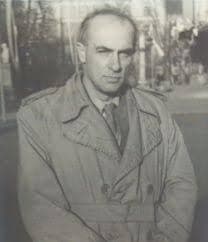
Alan Bush
Expressing an opposing political view can be dangerous to your health, and detrimental to your career. Just ask the British composer and pianist Alan Bush (1900-1995). A committed communist, his uncompromising political beliefs are not only reflected in his music, but it also led to a temporary ban on his music by the BBC. Having spent two years in Berlin and observed the early stages of the Nazi Party’s rise to power, Bush joined the Communist Party of Great Britain in 1935. In 1941, Bush joined a number of musicians, artists, and writers who signed up for the communist-led People’s Convention, which advocated an anti-war program and friendship with the Soviet Union. Even after the war, Bush refused to modify his pro-Soviet stance, prompting a critic to write, “In a less tolerant country he would certainly have been imprisoned, or worse. But he was merely ignored, both politically and as a composer.” Bush held the strong belief that music should be accessible to the mass of the people, and despite the difficulties he encountered in getting his works performed and published in the West, he continued to compose until well into his eighties. Then as now, having a strong political belief outside the self-anointed trolling mainstream will drop you into the middle of a “shit storm” in no time at all.
For more of the best in classical music, sign up to our E-Newsletter
Alan Bush: 3 Concert Studies, Op. 31 (The Music Group of London)




